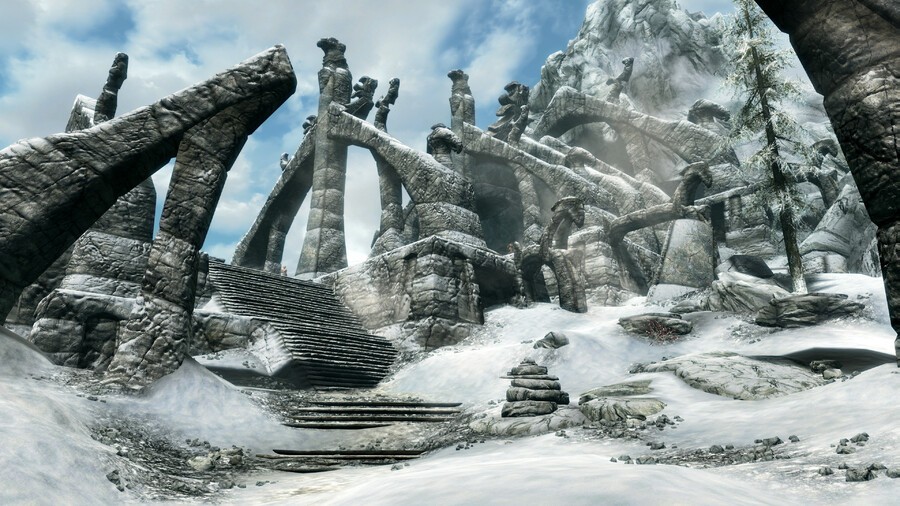
Along with many, I'm of the opinion that CD Projekt Red's The Witcher 3: Wild Hunt is one of the best – if not the best – open world role-playing game ever made. I mean, we gave it a rare 10/10 here on Push Square, after all. It improved the open world template in so many ways that make the genre such an engaging experience, while enhancing the ability tell a good story at the same time.
One of my personal gripes with open world games in general is that they seem to sacrifice good storytelling in exchange for a sandbox environment where you can go and do what you like in whatever order you wish. I get the appeal. This is, after all, one of the central things that make video games stand out from other mediums in that the experience can be non-linear; we are in control of what happens rather than being a bystander watching on from the sidelines.
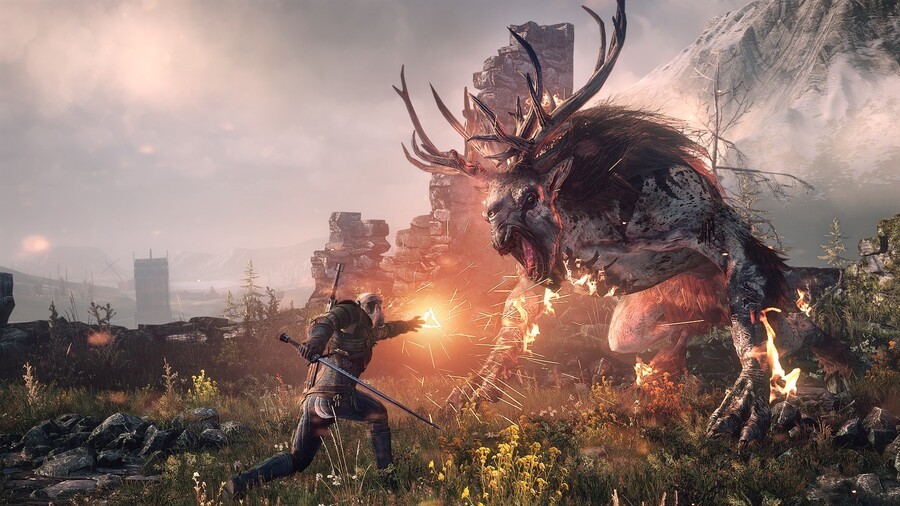
But as someone who grew up playing the more linear and story-focused RPGs of the 90s, I'm far more partial to a well-told story than I am a game that allows me to do as I like. The Witcher 3, however, bridges the gap between the two wonderfully. It might not have had the most engaging central thread, but the way it went about making all the smaller narratives and side quests interesting is what strikes me as the release's most significant achievement.
The Witcher 3 was so good at making me care about everything that I did – be it a witcher contract or even just finding someone's lost property – that when Bethesda's Fallout 4 was released a few months later, it simply fell a little flat for me. It was a good game, but the side quests and the world just didn't live up to what I'd received from CD Projekt Red's masterpiece. There were very few characters that I cared about, and I never really felt any sense of connection to what I was doing or why. I was merely playing a game.
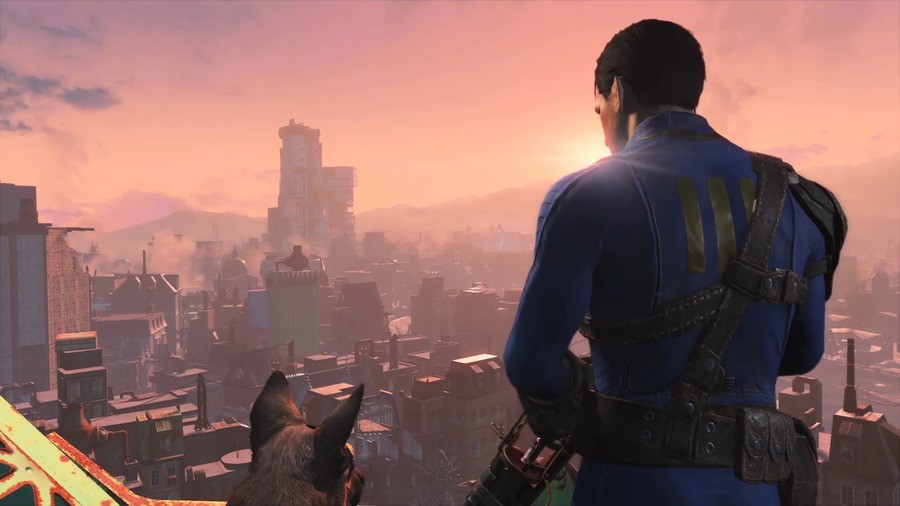
But maybe I was wrong. Maybe I was just caught up in that post-Witcher lull that always happens after finishing a game that you spend so much time playing. It's like a really close friend move away from home; nothing will replace them, and you sit there feeling sorry for yourself, comparing everything to what you once had.
There's definitely something unique about Bethesda's games, though. I thought going back to Skyrim – no matter how much better it looks on PS4 – was going to be a letdown after playing a game like The Witcher 3. But after mulling it over for a little while, I no longer compare all open-world games to that behemoth. I can now see what make's Bethesda's work different from that of CD Projekt Red – and in a good way.
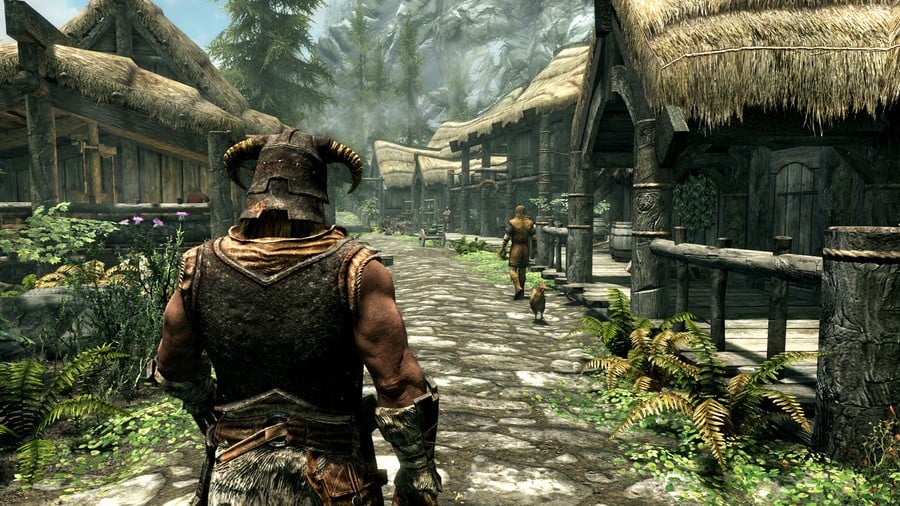
It's the sense of place and location that you get in Skyrim that strikes me the most. This is something I never really felt in The Witcher 3, and perhaps this is partly down to the first-person perspective rather than the more distanced third-person view. That sense of being there in that moment is almost palpable in the land of the Nords.
I'll happily spend hours just walking around Skyrim picking up flowers for my alchemy or exploring nearby caves. I never did this as the White Wolf of Rivia. While Geralt's story might be more engaging as a controlled substance – leading you from one place to the next through streams of quests and exclamation marks on your mini-map – Skyrim's story is about being yourself and about being in the moment. The story is your own, and you truly go where you will. You make that story whatever you want it to be.
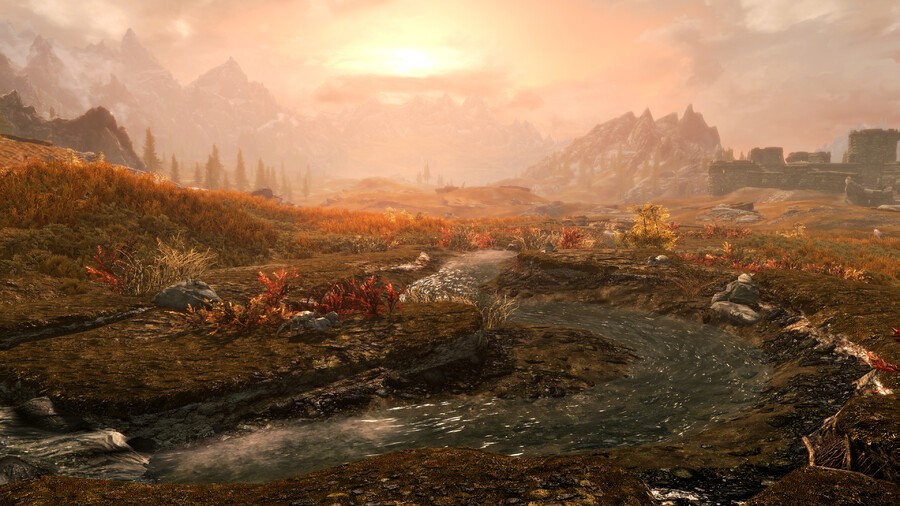
For all its positive points, this sense of discovery isn't at the same level in Geralt's adventure. In Skyrim, even the way miscellaneous quests appear in your log from overhearing conversations or speaking to the local barkeep come across as discovered moments rather than a pre-scripted agenda. Some of these only show up if you happen to be in a particular place at the right time and at the same moment as someone else.
And that's why, I think, even five years after its initial release, Skyrim still stands up today. It might not be as engaging from a quest design point of view, and it certainly doesn't look as pretty as some newer releases - even if it doesn't look bad by any means - but in its ability to submerge the player within its world and appreciate each and every moment as it happens, it truly is, to me, unparalleled.
Do you agree with Jacob's opinion of Skyrim? Is it still an RPG that's well worth playing? Explore the frozen North in the comments section below.





Comments 33
Interesting article written from a different perspective to mine. I never really played Skyrim when it came out but absolutely loved TW3.
I'm playing Skyrim now and, surprisingly, I think it's fantastic. It offers something quite different to The Witcher, and whilst it has it's faults (combat, inventory, menus) it's a charming game that I can just get lost in!
I loved Skyrim on the 360, now I have the remaster on the PS4 but haven't really dived into it again. Yet. But it's there. I fell equally in love with The Elder Scrolls Online too - same as Skyrim in feel, just a lot more of it. A LOT more.
Interesting and valid comparison, but you can trace it back further.
I seem to remember Skyrim, Witcher 2 and Dark Souls all releasing very close to each other and all being fantasy style RPGs, but all being fairly different enough if you are an RPG fan.
I love all three games, but these series have all become notably divergent examples (trendsetters, even) in the genre.
Up until the rerelease I felt Skyrim (and to a certain extent the whole Bethesda template) had aged quite badly. I even stopped playing Skyrim a few years ago as the graphical standard on 360 made me sad, and the technical problems on ps3 made me annoyed. I'm playing it on PC now, and it's the game I always hoped it would be in my mind. It feels as though it's complete (only took 5 years and 3 purchases....). If I could wish for one more thing, co-op would totally blow my mind.
Having said that, in a post Witcher 3 world, Bethesda really needs to raise their game for whatever comes next (combat is still woefully janky if I'm honest).Fallout 4 wasn't all I hoped it would be - and I played it before I got around to Witcher 3!
Dear @jacobhull23, right in these days I'm playing TW3 Complete Edition. I've already spent almost 100 hours in its gorgeous world, but still I have to understand if it's me or the game having an existential problem. I'm playing on the hardest difficulty and the lack of challenge and satisfaction is killing me; every mission is 75% talking, 15% exploring (meaning with that, just follow the track...), 10% fighting and that makes the "action RPG" label sounds incorrect. There's no real need in crafting armors or weapons, the potions I create are useless because all enemies can be defeated with the same combo without problems and so on.
Thinking of Skyrim, it had the very same problems years ago.
Fallout 4, at least, offers same challenge and better RPG elements to create a different character; playing as an heavy tank or as a silent sniper it's not the same thing in the Commonwealth.
Open world games surely have some magic, but it just seems it doesn't work for me anymore: I feel the technical features are stealing always more space to pure gameplay.
I agree with just about everything that Jacob's written here. There's definitely something unique about the worlds that Bethesda creates (and I'm not just talking about the bugs).
I'm at 52 hours already, damn, Skyrim's got me again. All builds considered I must be over 1500 hours by now.
@wagleton
Off topic slightly, but your comment reminded me of a Steam user review for EVE: Online. His review just said: "i think im getting the hang of it now.." (he had clocked up over 1500 hrs in-game)
On topic.. For me the single thing that seperates these two behemoths is immersion factor (eyes rolling abound, i know..) In TW3 you are Geralt, & no matter how bad-ass he may be, he'll never be MY skinny Khajit archer thief who somehow existed in Morrowind, Oblivion & Skyrim. For me, no narrative can top the one that im allowed to play out myself
Hmmm for me Witcher 3 doesn't even enter the top 5 best RPG's ever made. All 3 of the last Elder Scrolls games best it easily. That's not to say I think it's a bad game, certainly not but even the mighty Skyrim, as great as it also is, has a long way to go to beat Oblivion in my eyes.
Aye, not sure the story in witcher 3 was all that great though. Still prefer dragon age to all the other RPGs this gen.
Great article! I have always been a fan of the RPG genre, starting with Kings Quest and Leisure Suit Larry way back in the day haha. But Fantasy Realms are where its at for me. I loved the Oblivion series on PC, but Skyrim I played only on PS3, and loved it(minus the technical issues and late delievery of DLC). But Skyrim was the best ARPG I had played at that time..and then TW3 came along and blew me away. I cant say to this day which one I enjoy more, but I havent picked up the PS4 remaster yet. Pretty stoked to relive it all again with improved performance and visuals!
@Bad-MuthaAdebisi Yeah, I think it's all the smaller side quests that made the Witcher 3 so good. The main plot wasn't really all that interesting for me. But that's what made The Witcher 3 so special: it somehow made the side quests more than just side quests – I was actually invested in them as stories in their own right, rather than doing them just to be a completionist or to level up.
I have other games that I want to finish...but I just keep going back to Skyrim instead. It's just such a good game. To be honest, it's a little weird not getting trophies for the game (I'm playing this time with a couple of mods), but if any ps4 game was worth playing again without trophies, I would definitely say Skyrim is it.
Booooo Skyrim
Yay Witcher
Drum Roll, Pyrotechnics, strippers and Diego Maradonna doing the after party Final Fantasy 15!!!
@themcnoisy Skyrim is way better than Witcher bro. Way better
@themcnoisy One just don't mispell "Maradona".
https://m.youtube.com/watch?v=Ijtw6WZaSvk
My biggest issue is how the melee combat feels. I can't even tell when I making contact with a blow or if I'm even doing any damage if I do. There's no rumble when it contacts to let you know you connected, there's no animations are audio cues or anything. It's like swinging through thin air.
I may go switch to a mage just because the combat is very underwhelming
@JaxonH It's better than it was on PS3 now that it has a solid frame rate. At least now things are running smoothly enough to use a shield somewhat strategically, but Dark Souls it isn't. Best class is archer IMO, lots of fun taking out enemies from range while sneaking for 2x damage and some of the perks are cool.
@JaxonH try being a Mage. I also find melee combat cumbersome and unsatisfying. Casting magic feels a lot better to me.
It's a decent game. When I played it on PC back in 2011, I enjoyed building a stealth-based archer mage, as she could snipe and kill most enemies in one hit thanks to her build that granted insane bonus damage to stealth attacks and use powerful offensive magic to kill the enemies who wouldn't be sniped to death for whatever reason. I mean, she was kind of a glass cannon, but it's not too difficult to strafe around a bigger enemy and cast spells at it continuously.
I think I'm largely over Bethesda's game design philosophy now, though. What worked for me in 2011 doesn't necessarily work as well in 2016. Also, if Fallout 4 is any indication, Bethesda's is becoming less and less interested in designing RPGs and more interested in making open-world action games with RPG elements.
@GraveLordXD It's a different kettle of fish compared to Souls/Bloodborne in my opinion although they are great games. The Witcher is fine but I found myself disliking Geralt and his limited choice of weapons and magic. Skyrim isn't perfect but you can turn off the compass, pick a direction and watch the hours melt away in a way you can't with other RPGs these days.
I'd rate Divinity higher than any of the above, but again, different kettle of fish!
Very nice read, reflects a lot of questions and concerns I have for Skyrim. I'm probably gonna get it at some point for sure (not gonna pay full price for a 5 yer old game with a paintjob). In general, I feel like this remaster is something of a wasted opportunity, especially considering ESVI is supposedly not in development yet).
@kyleforrester87
I tend to think that a lot of dislike for Geralt as a character is a direct result of the gruff, tough guy voice acting. In my opinion the original Polish voice actor Jacek Rozenek is almost perfect in making Geralt more relatable. He's heavily sarcastic, can be tough, but can also be more human and gentle, which I think is a better representation of the Geralt from the books.
Aahh Divinity...What a quirky, yet stellar game. Currently giving it a second playthrough after quitting 30 hours in the first time. Never could totally immerse myself in this world and characters, yet there is no question of the overall quality and originality of this game.
@Lurker Yeah it was tough going at points but I've always loved that kind of RPG and I never managed to get all the way through Baldurs Gate, Neverwinter and Icewind Dale and didnt want to have the same regrets with Divinity lol. It does get way too obtuse at points toward the end.
@GraveLordXD From everything I've read they havnt announced a PS4 version as they are focused on the PC, but they acknowledge the process to port it is quite straight forward since they have already built the tech for Original Sin and have a good relationship with the console publisher so it's very much on the cards. As for Morrowind I honestly didn't play a great deal of it as my computer at the time wasn't up to the task. I never really liked the style of the enviornments either, where as Skyrim sucks me in with its style and soundtrack. I appreciate from a purely gameplay perspective Morrowind is likely better, though.
Atmosphere. Not Russ Abbot, the atmosphere created of a war torn land in the Witcher 3 is amazing, much better than Skyrim's attempt, in my opinion. I think it does most things better like combat, characters, writing and definitely voice acting. Both games are a joy to play but overall I'd say The Witcher is by far the better game.
Reading the comments it's nice to see there is such a range of RPG experiences to suit everyone. I'm one of those strange ones who could never get into the Witcher 3, but Skyrim is still one of my go to titles on the PC (thanks in part to the excellent mod support it has received from the community).
Some questions;
1 Is game+dlc included on the disc?
2 Can the shallow dephth of field and yellow tint/bloom be disabled? The bottom screen shot looks horrible, and for me unplayable graphics.
3 Has the save file size problem really been fixed?
4 Is there noticeable blurring when just looking around with the camera?
I really appreciated the good things Skyrim did well but ultimately I got bored with the repetitive dungeon gameplay and never finished it...
@Tenacious-P Why do you think Oblivion is so much better? I played both of them a little bit (no more than 50hours each I think) and I enjoyed both of them equally much.
Skyrim for me is the best RPG better than Witcher 3. Even Dragon Age Inquisition grabbed me more than Witcher 3
@dryrain
Everybody's entitled to their own opinion and all but damn...You must be really into this "create your own character" thing, as it seems the only logical reason I can come up with liking Inquisition more than the Witcher.
Skyrim is my fave out of the games mentioned here. I liked Witcher 3, DA Inquisition and all, but not as good as Skyrim for me. Most disappointing for me was Fallout 4; shame about that one.
One thing I've been dying for ever since Morrowind is the ability to create mixed races. Imagine the character possibilities it would create if we can finally create mixed races instead of the same ones every new Elder Scrolls game.
I sold my launch PS4 a few weeks back in preparation of getting a new PS4 Pro and hopefully this game shortly after. Looking forward to the patch it is supposed to be getting to support 4K. I played this game so much on Steam and look forward to playing it on PS4 now. The PS3 version was a little buggy for my taste back in the day and with it's lengthy delays between DLC I eventually sold it. I know it's strange but this, Fallout 4 (with all DLC) and Watch_Dogs 2 are probably the games I'm looking forward to playing most this year.
@Flurpsel Several reasons. really. I much prefered the land of Cyrodiil, the quests, the main story arc. The guilds in particular were way superior. Specifically though the fact that you couldn't use spells without being armed in Skyrim really grated on me. In Oblivion you could have a spell equipped & use it at any time whether armed or not (very good for running from those bigger than you whilst healing).
The UI, the journal & map were much clearer & more detailed in Oblivion. The quick choice menu had equipable slots on all 8 directions on the d-pad.
There are a few other things but I'd love to see a redux of Oblivion. I don't have a gaming PC & can't really afford one otherwise I'd be all over modding it
Show Comments
Leave A Comment
Hold on there, you need to login to post a comment...